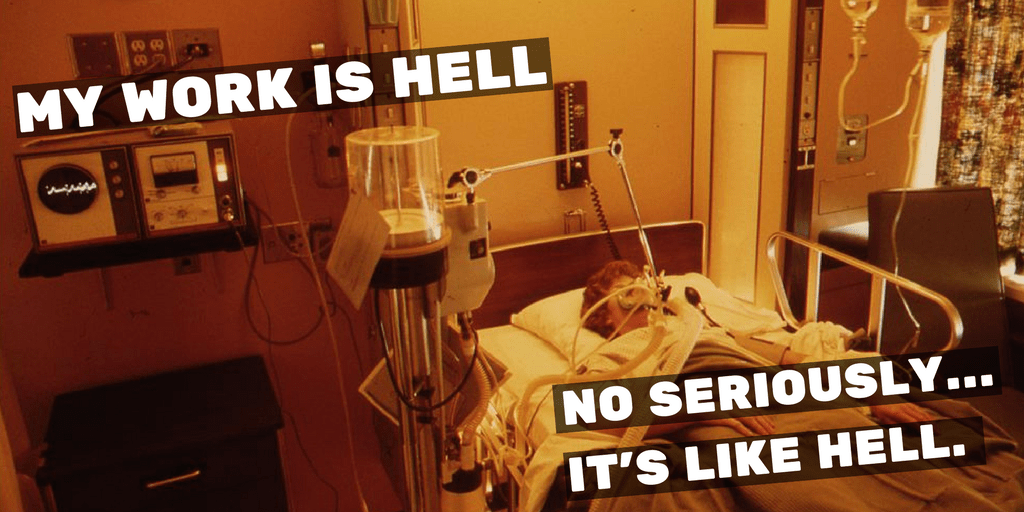
‘How was work?’ she asks when I come home. I wonder how to answer that. Recently, the answer has become, ‘I’d rather not talk about work,’ and now I’ve realised why.
I work as a doctor in ICU, meaning ‘Intensive Care Unit’. The ‘Intensive’ in ICU represents the bulk of what we do. Each patient has a single nurse dedicated to looking after them. The ward I work on currently has around 30 beds, and at any time, it is about two-thirds full.
The criteria for being admitted to ICU (pay attention medics) is ‘organ support’ by which I mean, if your organs are starting to shut down and not function, then this is the place you need to come to have machines do the work for you. In reality, the machines only just keep you ticking over. They are a pit-stop for the body, and can never match the elegance of human physiology.
Our patients can be on a variety of machines, but the most common ones are those that support the lungs, kidneys and blood vessels: ventilators, haemo-filtration machines and vasopressors. At bigger ICU centres, one can also find ECHMO: extracorporeal membrane oxygenation. Yes, it is as cool as it sounds, acting to replace both the functions of your heart and lungs.
Being in hospital as a patient is hard as it is, but being in ICU is horrendous. Imagine not being in control of even the most basic functions of your body, like the depth or rate of breathing. Imagine having to rely on others to wet your mouth and clean the most intimate parts of your body, often being unable to speak as a result of the tracheostomy in place in one’s throat.
Being in ICU is like being in hell. Indeed, the Qur’anic description of hell seems to match ICU perfectly, as detailed in the Qur’anic lectures of Hazrat Maulana Noor-ud-Din, the first Khalifa of the Ahmadiyya Muslim Community, a renowned physician of his day.
He spoke of how the Qur’an refers to hell as an ummahu or a ‘nursing mother’. Elaborating, he said: The word ‘umma’, the nursing mother, also describes the relationship between mother and child… In this abode, the dweller of hell is nursed and brought up in the same manner as a child is nursed and brought up. Moreover, as the love and mercy of a mother towards her misbehaved, naughty, and discourteous child is stronger than her anger and punishment, so is the Love and Mercy of the Almighty Lord.
The analogy doesn’t stop there, but takes on far more literal application. The first Khalifa highlighted the words used to describe hell in the Qur’an, such as Al-Mihad. This word is derived from the word mahada meaning ‘an abode, a resting place with provisions’ or as he put it, a kind of convalescent home. In modern parlance, this is what we would call a nursing home or a hospital.
Just as in ICU, each patient’s condition is closely scrutinised, and their every bodily function monitored and regulated, so too is the case in the Qur’an’s description of Hell. The Holy Book describes hell as Al-Mirsad, which is usually translated as a place from where one is ambushed. This, however, is simply an interpretation of its original, plain meaning: ‘a place of close observation’. Patients who receive treatment are observed closely, the first Khalifa noted. They are under watchful eyes when under intensive care.
Just as a hospital stay can be a trial by fire, the Qur’an too describes hell as a Fitna, meaning a ‘trial’. In Arabic, this word carries the connotation of purifying gold by heating it and removing all impurities.
Putting these words together, the first Khalifa summarises the Qur’anic description of hell as a nursing home, hospital and a recovering centre, a place where one is observed closely… Hell is thus a remedial place and a resort for recovery. It is not for the purpose of torture or reprisal and retaliation, but for the preparation of the corrupted human souls for further unending progress, to make the soul fit for further advancement so that it may be awakened for a higher eternal life.
Like a hospital then, hell too is a place of misery and anguish, but it is not purposeless, the ultimate aim being to nurture the soul to full health. The question then arises: what happens after the healing is complete, according to Islam? The Prophet of Islam himself furnished the answer in his description of the day the last inhabitant of hell would enter into paradise, and the conversation he would have with God.
It is easy, for both the believer and the non-believer in their own ways, to make a caricature of the subtle, nuanced concepts of religious teachings, especially those relating to life after death. But it is not as fantastical and alien as we may first imagine. I see hell every day when I go to work. It is a reality for me and for my patients. The notion that our souls will also reap the health or sickness of our actions after death, as we do with regards to our physical health in this life, seems not only intuitive, but profoundly complete: a grand tapestry of recompense, spanning both worlds, material and spiritual.
When I see my patients struggling to breathe, or I hear them crying in their beds, or when I watch their loved ones staying by their sides, late into the night, I think of the condition of my own soul and ponder over its health. I take solace in the Qur’anic account of God’s reply to Moses, when the latter sought forgiveness for the sinners amongst his people:
“I will inflict My punishment on whom I will; but My mercy encompasses all things”.